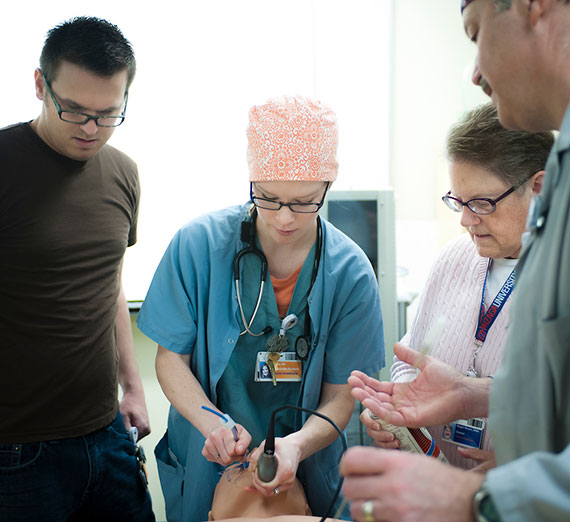Gonzaga Nursing Anesthesia Program Recognized as National Leader

Scot Pettey, director of Gonzaga University’s Doctor of Nurse Anesthesia Program (DNAP), puts the credit for the program’s recent inclusion on U.S. News & World Report’s “Best Grad Schools” rankings squarely on the community of faculty, staff and department leaders working to deliver outstanding health care and health education every day.
“It is amazing that the quality of the program is recognized by our peers, alumni and employers,” Pettey says of Gonzaga landing at No. 22 among “Best Nursing-Anesthesia Schools” for 2024, tied with Yale, the University of Kansas, East Carolina University, SUNY-Buffalo, Rush University and University of Maryland-Baltimore.
“We are the only nurse anesthesia program based out of the state of Washington, so to have a national reputation is a true honor.”
Gonzaga has long delivered hands-on training in vital areas of health care, and the nursing anesthesia program has evolved several times into its current state as a national leader.
In 1977, Gonzaga partnered with Spokane’s Providence Sacred Heart Hospital to offer a Master’s in Anesthesia Education (MAE). It started educating six-student cohorts working through the program in 24 months, through GU’s School of Education. The MAE program eventually grew into a 28-month program with eight students.
Pettey joined as department chair just as Gonzaga and Providence together transitioned the MAE into the current Doctor of Nurse Anesthesia Program, which launched in 2015 with a cohort of 10 students. Now, the DNAP program being recognized in the new US News rankings is an 88-credit, 36-month track able to offer 24 positions each year to working nurses with at least a year of critical care experience.
The partnership with Providence continues to benefit both students and the hospital. Students take all their courses at Providence, Pettey says, and participate in the care of patients. They receive mentoring and support from both professors and medical professionals from their first day in the DNAP program.
“They are part of the anesthesia department at the hospitals,” Pettey says. “They are given opportunities to learn with some of the leaders in the field.”
While the near-50-year partnership between Gonzaga and Providence showcases GU’s long-standing dedication to health education in the Inland Northwest, there are several new initiatives in the field coming online as the result of an updating of Gonzaga’s Strategic Plan.
In 2024, the former School of Nursing and Human Physiology evolved into the School of Health Sciences, representing GU’s desire to grow more broadly into health care fields. Also in 2024, new Dean Julie Wolter arrived with expertise in rural health care delivery and education, and a passion for working with health students dedicated to underserved communities.
New programs are being built at Gonzaga in public health, biomedical engineering, neuroscience and other areas to fill gaps in health care in the region and give health care students the means to pursue a range of professional opportunities.
“The school has a strong history of community engagement, experiential learning, and excellent faculty, programs and students,” Wolter says.
New students will find, no matter health care program they pursue, an education rooted in “cura personalis,” the Jesuit idea of caring for the whole person. Pettey believes that aspect is one of the reasons for the nursing anesthesia program’s ongoing success.
“Our Jesuit principals are one big thing that stands out as a differentiator for Gonzaga,” Pettey says. “We care about the whole student and treat them as the amazing people they are.”
